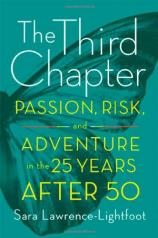Reading Group Guide
Discussion Questions
The Third Chapter

1. Discuss the cultural challenges and myths surrounding life after fifty. How have these challenges and myths shifted over time? How do you, your friends, and your family regard the different stages of life? Do you exalt youth?
2. Chapter one, “Loss and Liberation,” describes the fear that often comes with leaving behind a lifelong routine, or a career and an identity. How did the author’s interviewees cope with this uncertainty and anxiety? What did it take to spur them to change?
3. How has The Third Chapter shaped your definition of learning? How do you think the reverence society holds for IQ-enhancing learning differs from its respect for learning wisdom and patience? What would it take to get society to change the way it prioritizes these different kinds of knowledge?
4. Chapter three describes those who courageously confronted the past. Were you surprised that emotional wounds from years ago can have a significant impact on the Third Chapter? What common threads do Luther Brown and Pamela Stein share in the way they managed memories of authority figures? What power lies in writing our own narratives, as Grace Clark did when she left her job in publishing?
5. How has the boom in retirement communities, and even Franklin Roosevelt’s notion of social security for retirement, changed our concept of the aging process? How would your life look if you never anticipated retiring? Has retirement had a negative impact on the way we perceive the Third Chapter?
6. Chapter five captures the sometimes daunting experience of venturing into new places, such as Roma Wolfe’s sojourn from a physics lab to a low-income school. What are your “forbidden places”? What rejuvenation might you find there?
7. How do gender differences affect our approaches to the Third Chapter? Can age liberate us from gender stereotypes?
8. The conclusion of chapter five describes the stages of crossing boundaries: curiosity, letting go of fear, willingness to be vulnerable, developing empathy, and finally discovering that new learning doesn’t mean losing touch with your known world. Have you reached any of these stages? What are the risks and rewards of the process?
9. Sara Lawrence-Lightfoot describes the unique history of the current Third Chapter generation members, many of whom were steeped in 1960s activism. What makes it especially hard for this generation to “recede”? What special potentials does it possess?
10. Discuss the impact of ancestors in shaping your sense of self. How do your expectations of the Third Chapter compare to those of your parents’ generation?
11. Many of the people interviewed by Sara Lawrence-Lightfoot are artists. Does society encourage artistic expression? What are the emotional costs of stifling artistic urges until after retirement?
12. How does affluence affect the way someone experiences the Third Chapter? Can it be a time of significant personal growth regardless of economic status?
13. What aspects of education, described in the book’s conclusion, would most enhance a spirit of lifelong learning for future generations? How would reinventing the Third Chapter, beginning with the age groups that precede it, benefit society?
14. How did you respond to Erik Erikson’s notion of the “penultimate” stage --- a phase of production, not stagnation --- and the impulse to guide the next generation? Which populations would you most want to “give forward” to? Describe your ideal legacy.
15. In uniting new learning with body, voice, and soul, what struggles do you face? What instincts do you possess to help you work through them? In what ways do your internal and external terrains reflect each other?
The Third Chapter
- Publication Date: January 6, 2009
- Hardcover: 272 pages
- Publisher: Sarah Crichton Books
- ISBN-10: 0374275491
- ISBN-13: 9780374275495






